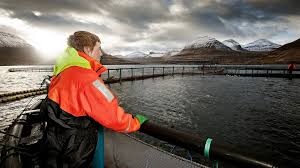Scottish Salmon Co boost for Bakkafrost Q4

BAKKAFROST today spoke about an exciting future ahead following its acquisition of the Scottish Salmon Company five months ago.
The Faroese salmon farmer delivered significantly improved results for the final quarter of 2019, which includes SSC’s contribution from October 8, the date when consolidation was completed.
The total operating EBIT (earnings before interest and tax) totalled 415.3 million (£46.6 million) Danish kroner (DKK) compared to DKK 207.7 in Q4 2018.
The farming segment produced an operational EBIT of DKK 338.3 million in the Faroe Islands and DKK 18.1 million (£2.032 million) in Scotland.
Harvested volumes in Scotland totalled 7,900 tonnes and 17,900 tonnes in the Faroes (12,234 tonnes in Q4 2018).
CEO Regin Jacobsen: ‘The beginning of the fourth quarter was characterised by high supply of small fish, which caused disruption in the market. At the end of the quarter, supply pressure shifted to demand driven growth.
‘Our harvested volumes in the Faroe Islands were the highest ever for a fourth quarter – with record big fish – the revenue and operational result was also record high for a fourth quarter.
‘The biological performance has been very good. The new Strond Hatchery is up-scaling production and contributes from now on significantly to our operation. We are pleased about the VAP segment’s good results for the quarter.’
He added: ‘2019 has been an eventful year for Bakkafrost. We have made a giant leap into a new geography by the acquisition of the Scottish Salmon Company.
‘This acquisition has increased the scale of our operation significantly and brought us new possibilities to exploit for many years ahead.
‘We are very excited about this but do realise that it will take time before we will really see results of the investments we will do in the Scottish operation.
‘We are convinced that this is possible, however, with the committed people we have in the organisation in Scotland and in the Faroe Islands.’
The group made a Q4 profit for of DKK 219.5 million (£26.6 million) (DKK loss of 6.6 million in Q4 2018).
For the whole of 2019, the profit was DKK 801.9 million (£90 million) against DKK 960.3 million in 2018.
The combined Faroes farming and VAP segments made an operational EBIT of DKK 374.9 million (DKK 207.7 million).
The operational EBIT per kg in Q4 2019 was also up at DKK 20.91 (DKK 16.98), which corresponds to NOK 28.25 (NOK 21.91) for the combined Faroes farming and VAP segments.
For 2019, the combined Faroes farming and VAP segments made an operational EBIT of DKK 1,166.7 million (DKK 943.2 million).
Looking ahead, Bakkafrost said prospects for the farming segment in the Faroe Islands were good, and the overall operational performance very good.
And for SSC it predicted: ‘There are many possibilities in the Scottish operation, it will however take time to transform its operational performance.
‘The estimates for harvest volumes and smolt releases in both geographies are dependent on the biological development.’
The report continues: ‘Bakkafrost focuses on reducing biological risk continuously and has made several new investments and procedures to diminish this risk.
‘Bakkafrost focuses on using non-medical methods in treatments against sea lice and has invested in new technology to follow this strategy, including farming supply vessels for mechanical delousing and mechanical cleaning of nets in the pens.
‘During 2019, Bakkafrost’s specialised crews on board these vessels have further refined their skills and methods resulting in improved fish welfare.
‘The quality and performance of the smolts have also increased significantly and there are clear signs that the large smolt and non-medical delousing strategies are working successfully in the Faroe Islands.
‘Looking ahead, Bakkafrost will extend these strategies into the farming operation in the Scottish Salmon Company.’
Overall, the biological performance in the Faroese operation has been strong during the entire year backed up by good growth

